Analysis of McKinsey & Co contracts administered by Labor and LNP governments over the last 12 years shows cost blow-outs in eight out of 23 Coalition contracts compared with Labor’s two. The Coalition’s superior economic management narrative is taking quite a battering lately. Jommy Tee reports, aided by Ronni Salt.
WHEN IT comes to believing their own press, there’s little doubt the Morrison government has fallen victim to their own publicity. If we swallow the present government’s mantra, they are superior economic managers and their recent election victory has given them the mandate to continue on as before.
However, that should signal deep concern in the Australian public, largely because a host of economic and non-economic indicators have emerged that contrast strongly with the dubious lines Morrison and his Treasurer Josh Frydenberg have so routinely trotted out in the media.
Hospital Pass: Josh Frydenberg and the Coalition as, ahem, superior economic managers
For many economists, economic management is usually analysed through the prism of economy-wide or lead macro-economic indicators. However, this analysis of economic management is through a different lens — that of contract management, specifically the handling of contracts between the federal government and the firm McKinsey & Co over the past twelve years (2007 to 2019).
For those not familiar with the name McKinsey & Co, the corporate giant is an international global management consultancy firm which over the past twelve years has won Australian government contracts to the value of $157.2 million. (As an interesting side note, there are at least four McKinsey alumni in the current federal parliament — three sitting ministers; Angus Taylor, Greg Hunt and David Coleman, and one shadow minister, Clare O’Neil.)
Analysing McKinsey & Co’s federal government contracts over a twelve year time-frame provides an excellent basis for comparing the Labor and the Liberal-National party’s administration skills. Labor held government from 2007 to 2013, with the Liberal-Nationals holding power from late 2013 until the present — an even spread of six years for each party.
Likewise, the number and the value of contracts over each respective six year tranche is comparable. Research indicated 23 McKinsey contracts awarded under Labor at a total of $82.9 million compared to 27 contracts awarded under the Liberal Nationals at a total of $74.3 million. In addition, the concentration of the contract expenditure is confined to only two or three main portfolio areas for both of the opposing government’s terms.
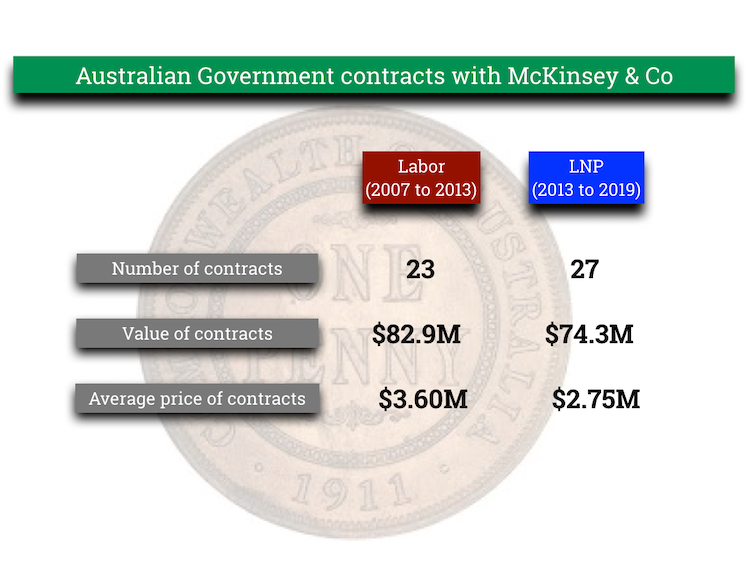
In the case of Labor, contract spending was concentrated around the portfolios of health, communication, the arts, and defence. In each of these areas, the majority of spending on health and communications can be traced back to a single contract with McKinsey.
In the case of health, a $33.7million contract in 2011 was for the ”provision of national adoption services relating to the introduction of personally controlled electronic health record”. Spending in the communications portfolio included a $25 million contract in 2009 where McKinsey’s provided “lead advisory services relating to the implementation study for the NBN”.
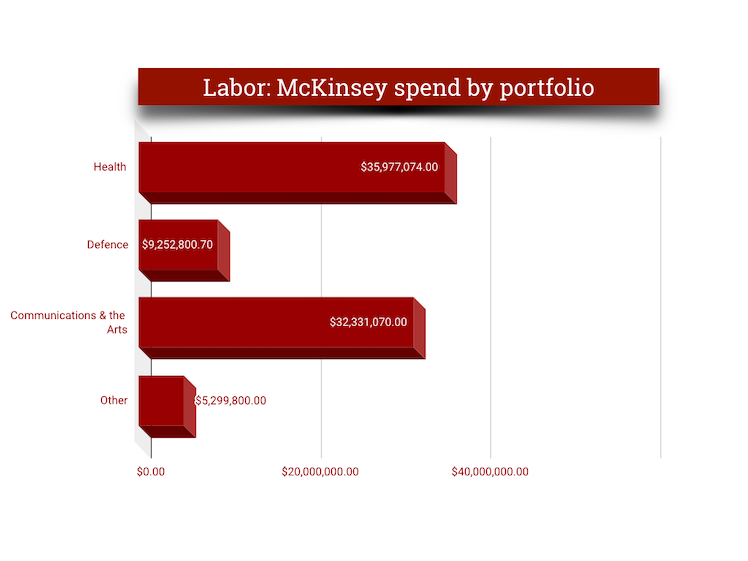
For the Liberal-Nationals, contract spending was concentrated around the portfolios of health and human/social services — and to a lesser extent ASIC/ATO. The Liberal-Nationals had two large contracts in the health portfolio: $30 million in 2016 for “advisory services on the aged care digital payments program” and $15 million in 2016 for the “provision of support services for the medical benefits review”.
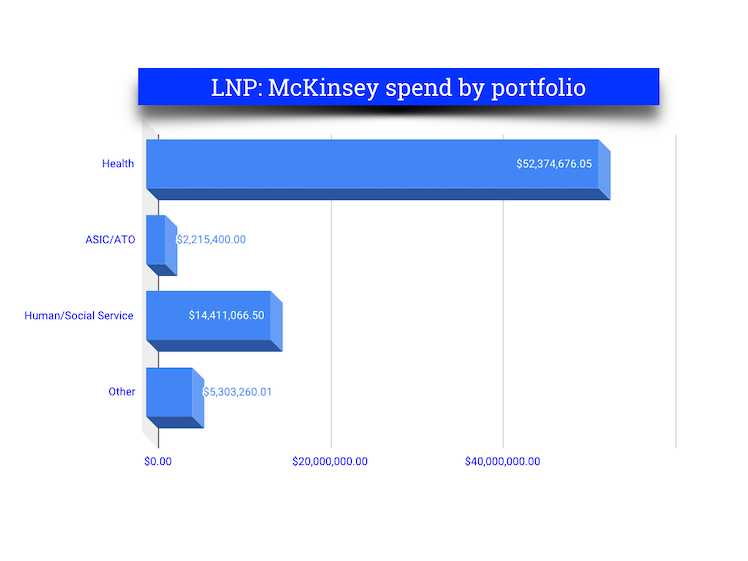
However, these headline figures mask a very real difference between the two administrations in the lost and dying art of contract management within the public sector.
The importance of contract management is drummed into any public servant from the very early stages of their career, and with justification too, because spending taxpayers’ money and achieving value for money should always be undertaken in the most judicious and accountable manner possible.
Contract cost blow-outs, while perhaps inevitable, should be eliminated as far as possible. They demonstrate poor administrative skills with regard to issues like defining the scope of the project, management of the contract and keeping within a predefined budget.
And when we analyse Labor versus the Liberal-Nationals with regard to contract cost overruns, an interesting picture emerges.
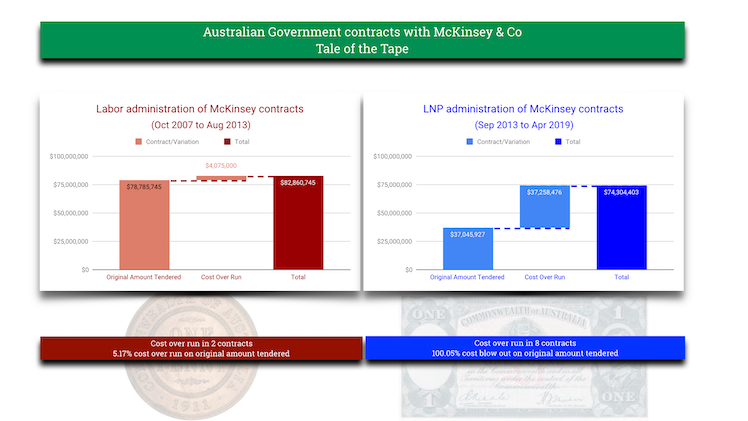
Labor only had 2 out of 23 contracts with cost overruns. The largest blow out (and the one responsible for the majority of the overall blow out) was a $3.8M cost overrun in the previously-mentioned large health contract. By any standards (well public service standards at least), that is a solid contract management performance across a six year period. Even where the major blow out occurred it was a manageable 12.7 per cent overrun based on the original tendered price of $29.9M.
Labor’s solid performance contrasts markedly with, what can only be described as an appallingly shoddy performance put in by the Liberal-Nationals. The Liberal-Nationals administration of McKinsey contracts resulted in cost blow outs in eight out of 23 contracts.
That’s correct — just over a third of all contracts blew out.
What’s more, the Liberal-National’s blow outs were not your ordinary run-of-the-mill blow outs within an acceptable band of cost overruns — they were of stratospheric proportions.
In fact they were cost overruns of 100.05 per cent over and above the original tendered price supplied by McKinsey & Co.
It is staggering to think that, under the Liberal-National’s oversight of government administration, McKinsey’s made more money out of contract variations $37.3 million than they did out of their original contracts ($37 million).
There are a number of other individual contracts that also require additional scrutiny, together with the ministers and their departments who were responsible.
The first of these is Ken Wyatt, the former Aged Care Minister. Under his watch, Wyatt and his department entered into a contract with McKinsey on 28 December 2016 for an original price of $10.1 million to provide advice on the aged care digital payments program. That contract was Take One, although it is begrudgingly admirable that McKinsey’s would take up work during the Christmas/New Year break.
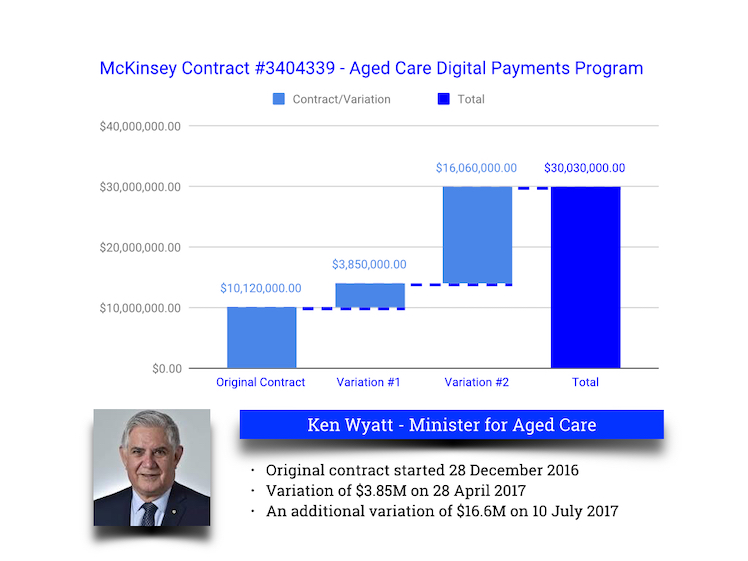
Take Two of the same contract occurred on 28 April 2017 when Wyatt and his department upped the contract to $13.9 million — an increase of $3.8 million on the original price and a cost blow out of a mere 38 per cent after just four months work.
Not to be outdone, Wyatt and his department decided to go all-in on Take Three of the same contract when on 10 July 2017 the contract was upped to a staggering $30.3 million that’s $20.2 million higher than the original tender. Yes, the contract price had trebled in the space of less than seven months.
The reason for this staggering blow out remains a mystery and despite intensive research, there is nothing on the public record relating to the blow-outs. The administration of this contract raises a number of probity issues:
- had the scope of the project changed so much that the project should have been re-tendered?
- what mechanisms, if any, were being employed to rein in spiralling costs?
- where was the administrative oversight?
- who suggested the variations to the contract — the consultants or the department?
- was value-for-money achieved, and if so, how?
No doubt there are many more and it would be interesting to hear a full explanation of how a contract could run so wildly out of control.
The bad news from a public accountability viewpoint is that the contract in question was not an isolated case.
Another example was a contract awarded by the Department of Health under the original watch of then Health Minister, Sussan Ley, which then came under the watch of the current Health Minister, Greg Hunt.
Ley and her department entered into a contract with McKinsey on 13 April 2016 to assist a review the medical benefits schedule for the sum of $4.9 million — that was Take One.
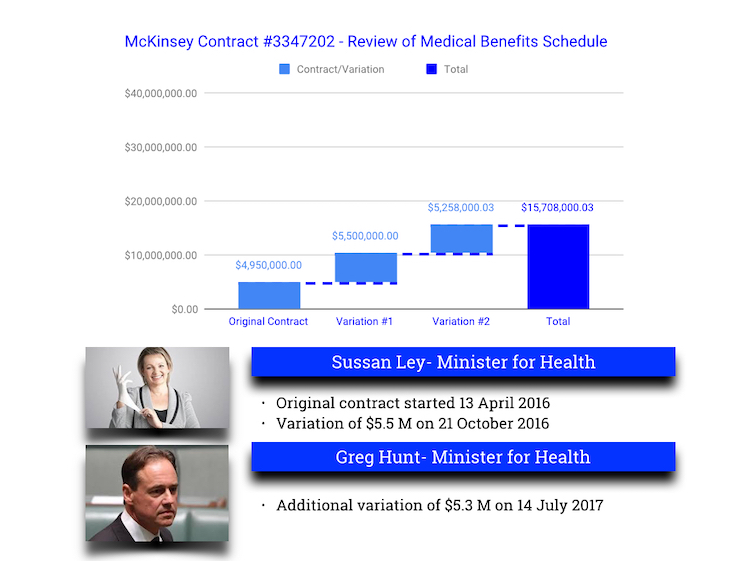
Take Two of the same contract occurred on 12 October 2016, still under Ley’s watch, when the contract was varied to $10.5 million — an effective doubling of the original price.
By this stage, Ley had been cast aside as a minister for transacting real estate while on official business, and the erstwhile Greg Hunt took charge of the portfolio. Under Hunt’s watch, the department implemented Take Three on 14 July 2017 and the contract was increased and finally settled at $15.7 million — a long, long way north from the original tender of $4.9 million.
Further examples of poor contract administration can also be found in the National Disability Insurance Scheme (NDIS) area, where journalist Rick Morton (at that time with the Australian), exposed the fact that McKinsey were paid an extra $3.9 million on top of their original $5.1million to rectify the work they had originally submitted as part of the NDIS Independent Pricing Review. The awarding of the original contract occurred under Christian Porter’s watch, who was at the time the senior portfolio minister for social services.
There is also the Department of Foreign Affairs and Trade contract with McKinsey that commenced on 7 September 2016, that went from $200,000 to $49.5 million and then back to $495,000, but the lunacy of that maladministration is perhaps best left for another time.
Fast forward to today. The election has been and gone and the “sound economic managers” have been returned. Greg Hunt has been re-appointed as Health Minister, Sussan Ley returns to the ministry as Environment Minister, Ken Wyatt has a new portfolio of Indigenous Affairs and Christian Porter is Attorney-General, as well as being responsible for industrial relations.
In addition, all of these four politicians responsible for overseeing $37.2 million in cost blow-outs are cabinet ministers, proving the old adage that once you’re in for a penny, you may as well be in for a pound.
Latest figures confirm the Coalition is not only the worst economic manager in Australia’s history, but one of the worst in the developed world. Good call to have the election before the June national accounts. Please read & retweet. https://t.co/zEiuK4bHOJ via @MichaelWestBiz
— Alan Austin (@alanaustin001) June 6, 2019
Rowers’ Reprise: how Angus Taylor’s mates cleaned up without him
Public support is vital so this website can continue to fund investigations and publish stories which speak truth to power. Please subscribe for the free newsletter, share stories on social media and, if you can afford it, tip in $5 a month.


